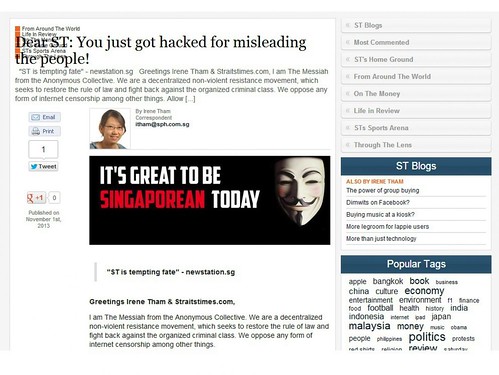So the latest news in South East Asia is that someone claiming to be affiliated with Anonymous is waging a digital war against Singapore due to their proposed Internet licensing rules, which are akin to backdoor censorship.
You can see the Youtube video here:
The Anonymous Legion Threatens Singapore Government
They already started by attacking one of the major Singaporean newspapers, the Straits Times – which was successfully defaced.

The full protest and expected action by Anonymous should take place tomorrow, November 5th – the day synonymous with Guy Fawkes.
A hacktivist claiming to be part of Anonymous has backed a call by Google, Facebook and others to scrap proposed internet licensing rules in Singapore which have been described as state censorship by the back door.
In a YouTube video, the figure argues that “no government has the right to deprive their citizens the freedom of information”, and calls on “fellow Singaporean brothers and sisters” to protest on 5 November if the licensing proposals aren’t binned.
The hacktivist, who goes by the name ‘The Messiah’, has already been at work, defacing a web page of Singaporean newspaper The Straits Times with the message: “Dear ST: You just got hacked for misleading the people!”
It seems The Messiah wasn’t happy with the way the paper reported the video, after it “chose to conveniently modify the sentence ‘war against the Singapore Government’ into ‘war against Singapore’.”
The new Licensing Regime, which was revealed earlier this year by the Singaporean government, will require online news sites reporting on the city state to put up a “performance bond” of S$50,000 and “comply within 24 hours to MDA’s directions to remove content that is found to be in breach of content standards”.
It’ll be interesting to see if they target more corporations or governmental organizations, the media in Singapore lies somewhere between the two – with the majority of the mainstream media being owned in part or somehow controlled by the government.
The licensing scheme seems to be some kind of effort to control the smaller or so called ‘independent’ or ‘alternative’ news outlets online, which do cause a lot of problems in oppressive countries.
Singapore’s government, which has been formed by the same party for over 50 years, either directly or indirectly owns traditional media. The new rules have therefore been seen as an attempt to bring to heel foreign owned and independent sites which locals read for less-likely-to-be-sanitised news.
The licensing proposals have already garnered strong opposition. Over 130 Singaporean web sites blacked out their home pages in June and activists attended a #FreeMyInternet rally in the city state’s Hong Lim park.
The Asia Internet Coalition, which lists Google, Facebook, Yahoo and others among its members, has also been highly critical.
The coalition wrote in an open letter to communications minister Yaacob Ibrahim in July that the proposed rules “could unintentionally hamper Singapore’s ability to continue to drive innovation, develop key industries in the technology space and attract investment”.
Despite its façade as a shiny, modern Asian nation, Singapore ranks a lowly 149th on Reporters Without Borders’ Press Freedom Index 2013, sandwiched by Iraq and Russia.
Singapore already ranks extremely lowly in the press freedom index, and this move, if successful, is likely to push it even lower. Singapore as a whole is known as being a pretty tech-forward and Internet savvy nation, so it’ll be interesting to see how tight their cyber-security is and if Anonymous can make any serious in-roads.
As always we shall wait and see.
Source: The Register
